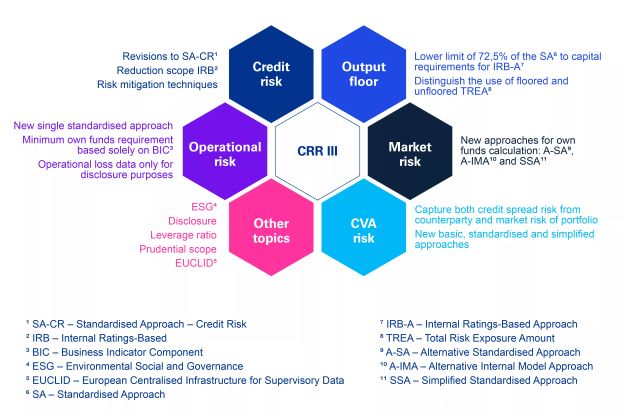The evolving regulatory landscape for credit institutions may lead to an increased challenge to keep up with such changes and ensuring compliance in view of uncertainty arising from new regulations.
In an effort to continuously support organisations to navigate new regulations and new obligations, KPMG in Malta recently hosted a webinar, in collaboration with other KPMG network firms and the Malta Financial Services Authority (MFSA), highlighting the upcoming regulatory changes arising from the new banking package, more specifically the Capital Requirements Regulation III (CRR III).
This webinar brought together around 90 participants from most local banks, the Central Bank of Malta (CBM) and the MFSA. Speakers included experts from KPMG Malta, Germany, and Belgium network firms, as well as Anabel Armeni Cauchi, Deputy Head of Banking Supervision at the MFSA.
Alex Azzopardi, a Partner from KPMG in Malta's Risk Consulting function kicked off the session by providing an overview of how the Basel 4 banking package is structured, mainly through the changes to the CRR III, Capital Requirements Directive VI (CRD VI), and the Daisy Chain Proposal. The new regulations are still at proposal stage and there is an ongoing Trilogue between the European Commission, the Council of the EU and the European Parliament, with the finalised rules expected to be issued later on this year.
Highlights of the main changes expected to be brought about by CRR III on the Pillar I Credit, Market and Operational Risk capital-related calculation described by Ilenia Diacono and Maria Grech who form part of KPMG in Malta's Risk Consulting Advisory function. It was highlighted that the main impact of CRR III on the local credit institutions, will be on the Bank's credit risk capital allocation due to evident changes in the standardised credit risk approach, wherein there are proposed changes impacting different exposure classes – mainly Exposures to Institutions, Exposures to Corporates, Retail Exposures, Real Estate Exposures, and Off-Balance Sheet Exposures.
Some other changes to the Output Floor, Market Risk and Credit Valuation Adjustment (CVA) risk were also discussed by David Nicolaus from KPMG Germany and Allan Folly-Darlis from KPMG Belgium. David and Allan also provided some industry insights with case studies of institutions that have sought KPMG's assistance with implementing the CRR III changes within their organisation.
With regard to the regulatory expectations from the MFSA, Anabel Armeni Cauchi explained that credit institutions are expected to be aware of the effect of CRR III and CRD VI changes on their operations and integrate these in the next Internal Capital Adequacy Assessment Process (ICAAP) reports to ensure that the changes brought about by CRR III are adequately covered by regulatory capital.
Other changes brought about by the new banking package include an increased emphasis on Environmental, Social and Governance (ESG) risks where, in essence, credit institutions are required to consider ESG risks within their strategy and business model, risk management frameworks, and internal and regulatory reporting (through enhanced Pillar III disclosures). Presently the ESG Pillar III reporting is solely applicable to Large and Listed credit institutions however, CRR III extends these ESG disclosure requirements to less significant institutions while respecting the proportionality principle. Being one of the MFSA's High-Level Supervisory Priorities for 2023, Anabel explained that Sustainable Finance is at the forefront of the MFSA's supervisory efforts. The MFSA's regulatory expectations are aligned with the European Central Bank's (ECB) 13 expectations on climate and environmental risks.
Anabel also stated that the way forward from the MFSA with regard to ESG risks includes (i) an October 2023 deadline for feedback on "Dear CEO" letters sent during 2022 to Less Significant Institutions, irrespective of whether they were included in the ECB's thematic review on Climate-Related and Environmental risks; (ii) expected inclusion of ESG risks in the 2024 ICAAP (that is, 2023 reference year); and (iii) ongoing interaction through the MFSA Banking Supervision Function's Minimum Engagement Level Plan.
Participants at the webinar indicated that the biggest challenges banks face in implementing the changes brought about by CRR III include resources, data and technology, time, having too many regulations, and Board and C-suite support.
Main impact areas arising from the changes to the CRR

The way forward
At KPMG, we pride ourselves on our industry knowledge, technical expertise, and commitment to supporting institutions with their regulatory compliance challenges, such as by:
- Regulatory impact analysis: high-level assessment of how the implementation of CRR III will impact your organisation. We can highlight the main areas of impact and suggest recommendations of how the bank can prepare for these changes.
- Readiness gap analysis: gap analysis between your organisation's current processes and procedures and the new regulatory framework. We will highlight which areas require improvement to be compliant with the changes brought about by the new banking package.
- Assistance with implementing Banking Package changes: provision of advice and assistance on the most efficient and effective way to implement the regulatory changes within your organisation's processes and procedures. We can, inter alia, develop an implementation roadmap, assistance in updating policies and procedures, draft reporting templates, and training to staff (refer to the next point).
- Training: provision of training on any of the impacted areas from the implementation of this banking package. This training can be tailor-made to your bank's needs – both in terms of timing, frequency, and duration, as well as topics delivered, which can refer to bank-specific documentation and processes. Training can be developed and delivered to the Board of Directors, Senior Management and even first line functions depending on the needs of the bank.
- ESG assistance: we can offer several tailor-made solutions from ESG consulting and transformation, training, ESG maturity and materiality assessments, strategy and governance advice, ESG gap analysis, ESG risk management, data analytics and digital solutions, reporting and assurance.
Evolving banking regulation can make the process of keeping abreast with regulatory requirements a challenging one, however we are here to help you ensure ongoing compliance with even the most complex of regulations.
The content of this article is intended to provide a general guide to the subject matter. Specialist advice should be sought about your specific circumstances.


